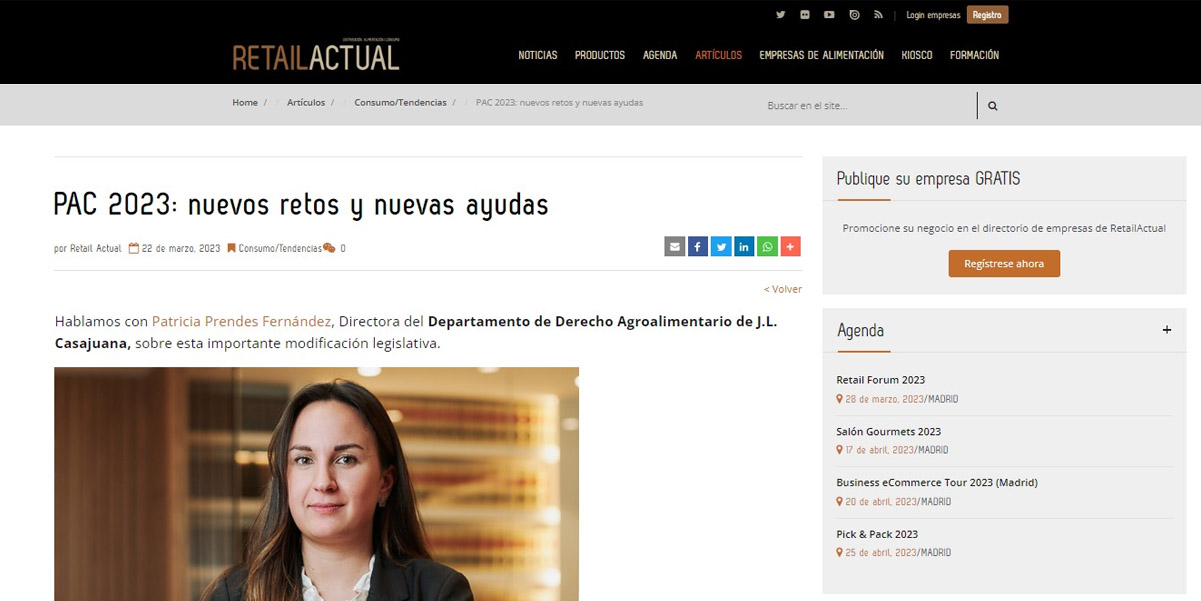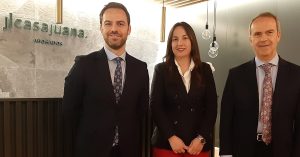PAC 2023: new challenges and new aid
Since its origin in 1962, the CAP, as a common European policy, has been adapting during its six decades of existence, to changes in the European Union, to the needs of the sector and to advances in technology, as well as to new environmental and climate requirements. The CAP was adopted at a historical moment marked by the post-World War II period. At that time, agricultural and livestock production had been devastated, endangering the production of raw materials and food, and consequently the supply of society.
Evolution of the CAP to protect the rural sector
During its sixty years of evolution, the PAC has been built on a series of programmatic and planning principles that underpin the actions of the European Union and its Member States, related to the agricultural sector, the rural world and the environment and climate.
The European Union has been configured on a series of principles, among which are the progressive liberalization of markets, the fight against internal protectionism; the elimination of agricultural aid that clashes with the free market; free trade and competition; the implementation of new aid and the fight against climate change and the protection of the environment. Another of the EU’s guiding principles is the strengthening of the development of rural areas linked to climate change and environmental protection.
The previous CAP system was initially established for the period 2014-2020. One of the biggest concerns of farmers and ranchers in recent months, is to have a real knowledge of how the new CAP will affect them from next year 2023. Nobody knows how to make a mere estimate of how the income to be received by farms in the coming years will be.
Implementation of the new CAP in Spain
It is expected that the new CAP, currently undergoing public consultation, will begin to be fully applied as of January 1, 2023. However, national governments, in view of the current situation caused by the rise in costs caused by the war in Ukraine, they consider the possibility of easing, or even postponing the date of entry into force.
For the period between 2023 and 2027, Spain’s budget amounts to 47,724 million euros, somewhat higher than in the previous cycle.
The general objectives of the CAP that is in the making are three:
• The promotion of an intelligent, resilient and diversified agricultural sector that ensures food security.
• Greater protection of the environment and climate.
• Strengthening of the socioeconomic framework of rural areas.
Provisions of the new CAP
With the new CAP, the Member States will be in charge of establishing the interventions to achieve the objectives, through direct payments in certain sectors, by the European agricultural funds, EAGF and EAFRD. This represents an important milestone, given that the types of agriculture and livestock are different from one State to another, which meant a great inequality when regulating the CAP.
It is intended to maintain income support for farms so that they are economically viable; At the same time, greater protection of the environment and climate is guaranteed, in line with the objectives set out in the European Green Pact.
The direct payments of the CAP will be allocated to truly active farms, reserving them for active farmers who generate a real activity. People who benefit from this type of aid must meet a series of requirements and good practices for the environment, food safety, animal and plant health, and animal welfare.
An active farmer is understood to be those persons affiliated with the Special Regime for Agricultural Work on their own account; that receive at least 25% of their income from agricultural activity; and that the amount of direct aid they receive is less than or equal to 5,000 euros per year.
It should be noted that the definition of active farmer does not prevent the granting of aid to multi-employment or part-time farmers who carry out other economic activities. With this change with respect to the previous system, it is intended to end the abandonment of agricultural activity and the consequent damage that this entails in food production and in the economy.
Basic Income Assistance
The Basic Income Assistance will continue to be granted depending on the different agricultural regions. In this new period, the basic payment rights that have values above the average for the region will be reduced in order to increase the value of the basic payment rights that are below the average. This provision is intended to alleviate the differences between farms located in the same region. This limitation is evident that it will harm large farms, and will benefit small and medium-sized ones, as it is understood that they require greater economic support. The redistributive payment, as a complement to the Basic Income Aid for Sustainability, is paid for the first hectares of all farms.
CAP, environment and climate
The reform of the CAP has an impact on reaching more demanding levels in terms of the environment and climate, which are carried out through a new approach to green architecture. The previous system, of conditionality, is transformed into reinforced conditionality, which supposes a minimum level of environmental and climatic commitment, mandatory for all farms. These requirements will be defined by each Member State, which will have to transpose certain obligations and minimum legal requirements by imperative of the European Union. The new reinforced conditionality is based on the provisions of EU Regulation 1306/2013 on the financing, management and monitoring of the Common Agricultural Policy.
The eco-regimes are a compensation system for those farms that carry out agricultural or livestock work that is favorable to the environment and the climate, through the assumption of voluntary annual commitments. Eco-systems are more demanding than conditionality. Seven practices are proposed, which in the case of pastures are extensive grazing and sustainable mowing or the maintenance of margins without mowing. The beneficiary of the aid can choose the practice that interests him the most depending on the circumstances of his exploitation, but on the same hectare only one type of practice can be carried out.
Spain currently has a rate of farmers and ranchers that is among the lowest in the European Union. In turn, the rate of entrepreneurship in Spain is very low, compared to other neighboring countries, this means that there are large imbalances between urban and rural areas. This has meant the need to implement a series of measures in this new PAC period that guarantee the settlement of young people in rural areas and the generational replacement, as a measure to avoid the increase in the cost of food products and food security.
The CAP for the period 2023-2027 seeks to solve the problems of generational renewal and the incorporation of women into the rural world. This new PAC differentiates young farmers and women farmers, being the first time that the gender approach is incorporated.
A new supplementary payment to the basic income support for young people up to 40 years of age is created with the aim of promoting generational relief on farms. This payment goes to new additions. If the owner of the farm is a woman, the remuneration is increased by 15%.
Another purpose of the CAP is the modernization of agricultural and rural areas, through knowledge, innovation and digitization. The aim is to bring the sector closer to the new demands of society and consumers. Among other measures, advisory services will be provided to farms on economic, environmental and social aspects.
The new CAP, which began to be drawn up in 2021, aims to respond to the economic, social and environmental needs of the rural world. It is intended to respond to the new challenges facing the sector, such as the consequences of climate change, digitization… In any case, it is clear that the CAP seeks the professionalization of farms and settlement in rural areas through through the generational change and the continuity of the family in the field.
We will have to wait and see if the new system finally begins to be applied in the next year, or if it will adapt to the current world situation. It is intended that the CAP be fairer, more social and more sustainable, to promote a sector that in recent times has proven to be strategic at the national level in economic and social terms.




















